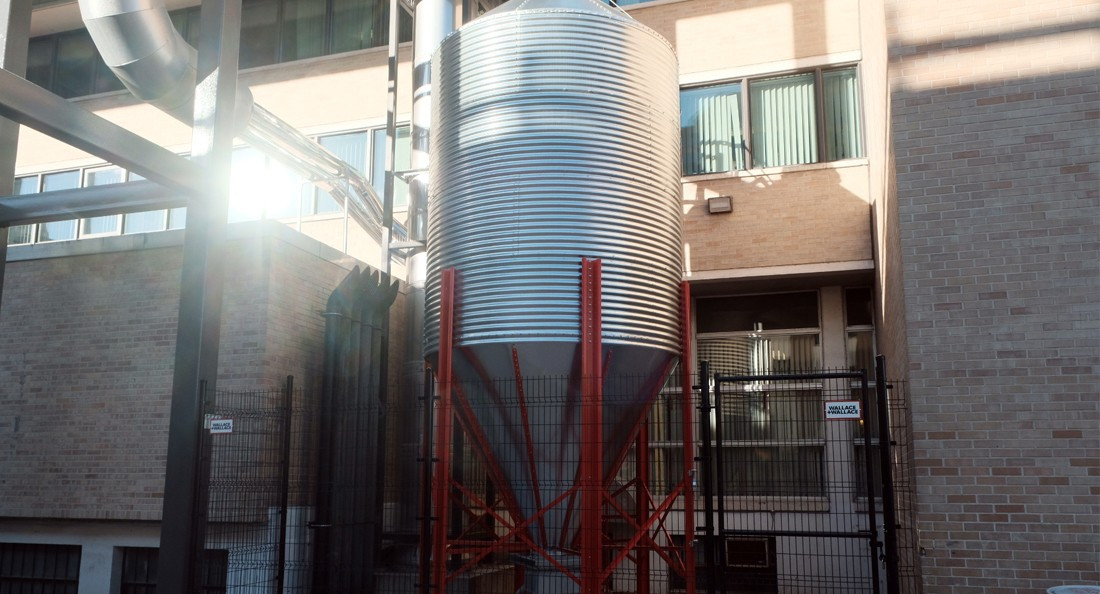Building sustainability on campus
Continuing efforts to green up U of W’s ecological footprint
The University of Winnipeg (U of W) is taking steps beyond the installation of the biomass furnace heating system with some new ideas and some continuing efforts for sustainability on campus.
According to Joe Wasylycia-Leis, U of W’s campus sustainability co-ordinator, the furnace has integrated well with the rest of the institution’s custodial operations.
“It fits with the general trend in facilities, such as there are now skills and practices in place for working with new technology,” he says. “The boiler will be fairly low maintenance, other than the times where it will need to be filled up with (biomass) pellets.”
“One of the exciting parts about (the biomass furnace) is that it is a bit of a trial project in partnership with Manitoba Hydro,” Wasylycia-Leis says. “It presents an opportunity for our facilities team to test out different fuels.”
Wasylycia-Leis says the U of W’s sustainability strategy places great importance on meeting and exceeding Canada’s commitments to the Paris Climate Agreement, which presents larger sustainability goals for countries to work towards.
“We have to show leadership as a public institution,” he says.
Gabrielle Geiger-Wolf, a third-year U of W science student notices many sustainability efforts on campus aside from the biomass furnace.
“Lots of students (at U of W) use the U-Pass,” she says. “It encourages students to take the bus rather than driving.”
Geiger-Wolf also notices the designated waste bins for garbage, recycling and compost, as well as many green-oriented changes to the Richardson College.
“The most important part for students is paying attention and being aware,” Geiger-Wolf says. “People often don’t take the environment into account, but if they do, they could really make a difference with the smallest actions.”
Those small actions include knowing how to dispose of waste appropriately, Wasylycia-Leis says.
“Every three years, we look at the waste coming out of certain buildings over a time period and evaluate how effective we are at disposing our waste properly,” he says. “Most recently, we’ve found that only 40 per cent of waste on campus is being accurately disposed of. That says to us that we need to do a better job of educating people on how to actually dispose of waste.”
Wasylycia-Leis says helping people take that first step of caring and taking ownership of their actions is very important to the sustainability office.
One way they plan to achieve that is with a change to the annual Grassroots Festival.
“This year we’re calling Grassroots a conference. Instead of having a five-day festival, it’s going to be a two-and-a-half day conference,” Wasylycia-Leis says. “People will be asked to register in advance and attend the whole thing from start to finish, so that we can offer a free and accessible transformative learning experience.”
Wasylycia-Leis says this change to Grassroots will educate people on current environmental issues from a critical perspective and show them ways that they can get involved as change makers.
“Sustainability is twofold for (the U of W). It begins with improving environmental performance - reducing our carbon footprint and diverting our waste from landfills,” Wasylycia-Leis says. “We are also fostering a culture of sustainability and environmental education on campus - so that people who come through our institution leave with a deeper sense of responsibility for making our world more socially and ecologically sustainable.”
Wasylycia-Leis invites students to visit the U of W sustainability office’s Engagement Portal website to get involved in eco-friendly activity on and off campus.
Published in Volume 73, Number 6 of The Uniter (October 18, 2018)







